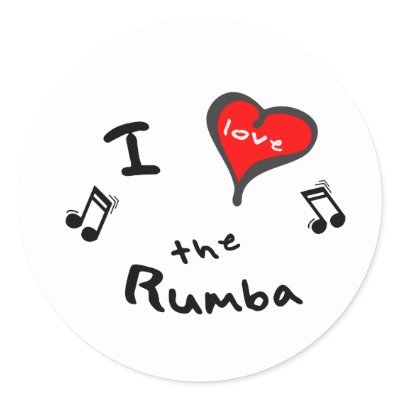Rumba is a family of percussive rhythms, song and dance that originated in Cuba as a combination of the musical traditions of Africans brought to Cuba as slaves and Spanish colonizers. The name derives from the Cuban Spanishword rumbo which means "party" or "spree". It is secular, with no religious connections.Rhythmically, Afro-Cuban folkloric rumba is based on the five-stroke pattern called clave and the inherent structure it conveys. Carlos Vidal Bolado (better known simply as Carlos Vidal) was the first to commercially record authentic folkloric rumba (Ritmo Afro-Cubano SMC 2519-A and 2520-B, circa 1948).
Rumba has also been described by some as a folkloric music and dance complex combination. This may because of the influences rumba has from the music and culture presented by Africans who were brought by the Spanish colonizers to Cuba to be slaves. The mixing of these two cultures, among others that later came into the culture, created a deeply rooted people.

Personaly,rumba is my favorite latin dance!!
Rumba has also been described by some as a folkloric music and dance complex combination. This may because of the influences rumba has from the music and culture presented by Africans who were brought by the Spanish colonizers to Cuba to be slaves. The mixing of these two cultures, among others that later came into the culture, created a deeply rooted people.

Cuban music is diverse in styles and background that comes from several cultures. In this area of Cuban music, Rumba is a generic term covering a variety of musical rhythms and associated dances. In this style, that includes a combination of both music and dance, vocal and rhythmic improvisation is both involved This includes a smooth combination of music, dance and poetry to produce a unique sound and dance
Rumba is now most commonly performed at informal fiestas or just in the street when the mood arises. Percussions and vocal sections make up rumba’s musical ensemble This African derived rumba dance and music also inspires poets and in turn they also inspire the dance and chants. Some poets, including Carmen Cordero and Maya Santos Febres, have said that a “poetic portrayal of dance maintains its meaning as a vehicle of resistance.” This could be taken as pushing for change and acceptance. These ideas go well with the expression associated with the rumba when it first emerged and when it became more widely accepted by all Cubans.
Personaly,rumba is my favorite latin dance!!










0 comments:
Δημοσίευση σχολίου